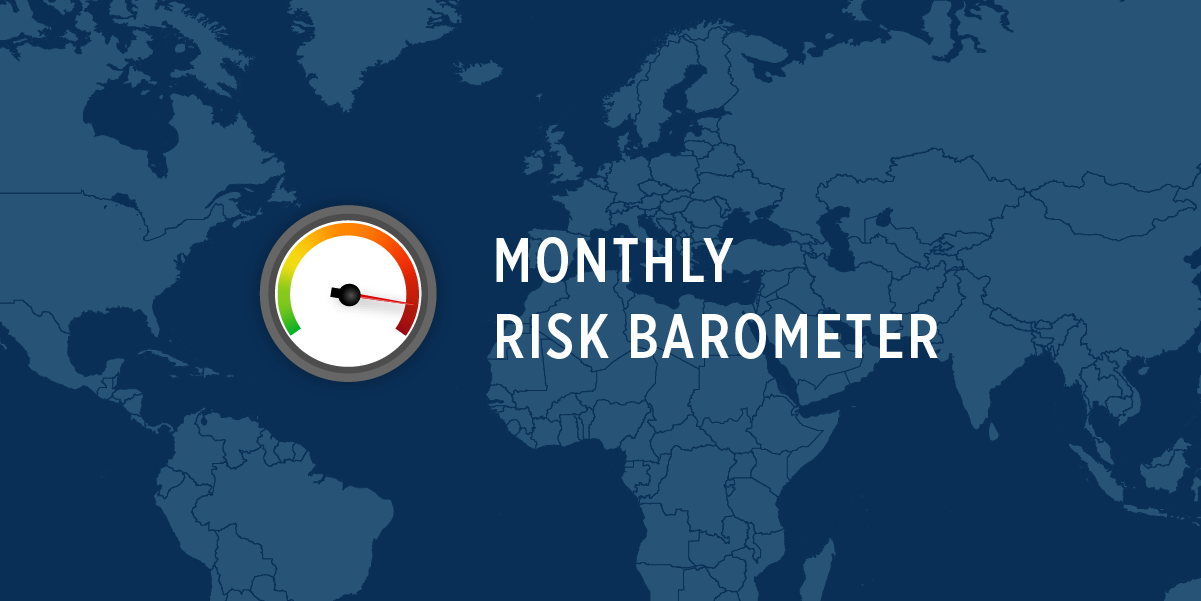In Global Guardian's monthly Risk Barometer, our Intelligence Team highlights current global hotspots with the potential to impact your business operations and travel. Read below for analysis on the threats we are closely monitoring this month and click here to subscribe for regular intelligence updates.
October 7th War Enters a New Phase
On 01 October, Iran launched a retaliatory strike on Israel with some 180 medium-range ballistic missiles to avenge the killings of Hamas’ political leader in Tehran and Hezbollah’s senior leadership, including its leader Hassan Nasrallah in Beirut. On 30 September, Israel commenced ground incursions into Lebanon as part of a “new phase” of its conflict with Hezbollah. The security and humanitarian situation in much of Lebanon is rapidly deteriorating as flights and other operations are disrupted across the region. As Israel plans its next steps, this new phase of the October 7th War is likely to expand into a more direct confrontation with Iran.
Israeli forces clashed with Hezbollah fighters inside Lebanon on 02 and 03 October as the IDF Air Force continued to strike Hezbollah targets in south Beirut and elsewhere in the country. The IDF claims to have killed roughly 100 Hezbollah fighters and has lost at least eight of its troops over two days of combat. Over a million people have been displaced in Lebanon so far and more than one hundred thousand people remain displaced in Israel, as Hezbollah continues to pummel Israel cities and towns from the border south to Haifa. Israel has implemented a partial blockade of Lebanon to prevent Iran from flying in arms and aid to Hezbollah and the IDF Air Force is conducting strikes on major crossings between Lebanon and Syria. Air travel disruptions stemming from Iran’s missile strike on Israel on 01 October have continued in anticipation of further strikes. Long lines have developed at regional airports as flights are canceled, delayed, or diverted away from the region’s airspace.
- Global Guardian recommends against all travel to Lebanon and all non-essential travel to Israel.
- Firms with personnel in Lebanon should arrange for their evacuation.
- Firms with personnel in Israel should have contingency plans for evacuation and shelter-in-place orders.
Recent Events
- 08 October: Following large Hezbollah rocket barrage, Israel closes schools in the Haifa area.
- 06 October: Iran cancels all commercial flights overnight.
- 03 October: Israel and Hezbollah forces clash in several towns on the Lebanese side of the border.
- 01 October: Iran fires 180 ballistic missiles at targets in central and southern Israel.
- 30 September: Israel launches limited ground incursions into Lebanon.
- 27 September: Israel kills Hezbollah Secretary General Hassan Nasrallah in an airstrike on the Dahiya suburb south of Beirut. Some 20 other high-level Hezbollah and Iranian officers are killed in the same strike.
- 23 September: Israel begins preparatory strikes across Lebanon.
- 17-19 September: Israel conducts two waves of attacks on sabotaged pagers, walkie-talkies, and other communications devices and decapitates Hezbollah’s Rwandan leadership in a bunker. The attacks killed dozens and wounded thousands of possible Hezbollah fighters.
Analysis
Hezbollah is a key Iranian strategic asset, as the proximity of the group’s substantial missile arsenal to Israel provides Iran with a “loaded gun” — the threat of an all-out missile attack by Hezbollah balances Israel’s nuclear deterrent through mutually assured destruction. Israel’s overarching goal is to reverse Iran’s “unity of areas concept” by defanging Hamas and Hezbollah to the point where they can no longer be used as a strategic cudgel against Israel. Hamas’s military threat has been eliminated and Hezbollah’s strategic threat is being rapidly eroded by the day. While the IDF and Hezbollah have been exchanging fire over the border since 08 October 2023, Israel has decimated its leadership, and is intensifying airstrikes on its high-value assets. Israel’s incursion into Lebanon itself represents a much more direct threat to Hezbollah’s value as an Iranian deterrent.
In this light, Iran’s ballistic strike on Israel on 01 October was Tehran’s attempt to re-establish deterrence and mitigate Israel’s current escalation dominance. But the attack was too robust to be ignored and by targeting Israel’s nuclear reactor and offshore oil assets, Iran has opened the door for Israel to respond in kind. Israel is poised to attack the Iranian military (air defense/radar, missile bases), economic (oil refineries/production facilities/export terminals), and nuclear sites or a combination thereof. Iran will soon need to decide whether to:
- Continue an attrition campaign: Maintain extreme political and economic and high military pressure on Israel by continuing the October 7th War via its “ring of fire” (regional proxies). But it risks slowly losing its vice around Israel as Lebanon and northern Israel continue to come under fire.
- Cut its losses: Allow Hezbollah to be severely degraded while seeking assurances that its own territory will not be further attacked. This could involve a new diplomatic agreement with the U.S. over its nuclear program and a partial revision to the 2005 status quo in the region.
- Escalate: Engage in a more direct war with Israel by expending Hezbollah’s remaining strategic weapons, launching more medium-range missiles into Israel and mining the Strait of Hormuz, or targeting Saudi oil infrastructure.
Looking Forward
Israel has promised to respond to Iran’s missile attack and is likely preparing strikes on Iranian targets. President Biden has signaled that Israel may receive U.S. support for such strikes while warning Israel not to attack Iran’s nuclear facilities. The scope and scale of the attack could reshape the regional security landscape and prompt an Iranian nuclear breakout.
Iran sent a message to the United States through Qatar saying “the phase of unilateral self-restraint" has ended and has stated that an Israeli attack on Iran would be met with an “unconventional” response. Iran’s other proxies in the region, particularly in Iraq and Syria, are likely to attempt to join direct fighting against the IDF in Lebanon in the case of escalation.
The Houthis may restart threatening Saudi oil infrastructure.
Key Takeaways
- Israel has seized the initiative, attaining escalation dominance as it now looks to press its advantage in this regional conflict.
- Flights cancellations and energy prices have already begun to increase in anticipation of Israeli strikes on Iran.
- There are no viable offramps as the war intensifies in Lebanon with fighting on the ground.
- Iran’s nuclear strategy calculus may now favor breakout as Tehran’s regime scrambles to adapt to the new strategic realities.
|
War in Sinaloa: Violence Erupts Between Los Chapitos and El Mayo Factions
Since September 9, 2024, the Mexican state of Sinaloa has witnessed a significant increase in cartel violence as the two dominant factions of the Sinaloa Cartel wage a brutal internal war. The conflict pits Los Chapitos, sons of Joaquín "El Chapo" Guzmán, against allies of Ismael "El Mayo" Zambada and his son Mayo Flaco, resulting in widespread violence, civilian casualties, and a climate of fear across the state. The violence kicked off several weeks after El Mayo Zambada was “kidnapped” by Joaquin Guzman and brought to the U.S. for arrest by authorities.
Escalating Violence
The violence has been concentrated in Culiacán, the state capital, but has spread to surrounding areas as well. Some key developments include:
- At least 53 homicides reported, with over dozens of people missing.
- Gruesome displays of violence, including tortured bodies left on highways with symbolic objects placed on them.
- Narco blockades and clashes between cartel members and security forces.
- Seizure of significant weaponry, including assault rifles, armored vehicles, and even drones.
Government Response
- The Mexican government has deployed over 2,200 additional troops to the region. In a significant development, the Mexican military took the step of disarming the entire Culiacán Municipal Police force on October 2, 2024. Law enforcement is now carried out by the military.
- This action was taken due to suspicions of collusion between local law enforcement and organized crime groups as well as corruption among municipal officers. Similar steps have been taken against other state and local law enforcement agencies in the past due to suspicion of collusion and corruption.
Propaganda
On September 29, 2024, El Mayos dropped propaganda flyers from drones over Culiacán, accusing Los Chapitos of betraying El Mayo and causing unnecessary violence in Sinaloa. The message also claimed that Los Chapitos were responsible for the deaths of innocent people and urged the public to support El Mayo's faction. This tactic is reminiscent of nation-state conflicts where propaganda flyers were dropped from aircraft on residents.
Impact on Civilians
The ongoing conflict has severely disrupted daily life in Sinaloa:
- Schools and businesses have been closed and business hours are reduced.
- Residents live in constant fear, with violence erupting unpredictably.
- Innocent bystanders have been caught in the crossfire.
Key Takeaways
- There is no end in sight to the violence in Culiacan and elsewhere in Sinaloa, at least until there is a “winner” in the conflict.
- The use of propaganda tactics by the Mayo faction suggests that this conflict is not just about territorial control and revenge, but also about winning the hearts and minds of the local population, along with shoring up support of potential allies.
- The people of Sinaloa remain trapped in a cycle of violence, caught between powerful criminal factions, an overwhelmed security apparatus, and now, a void in local law enforcement after municipal police were disarmed.
|


















